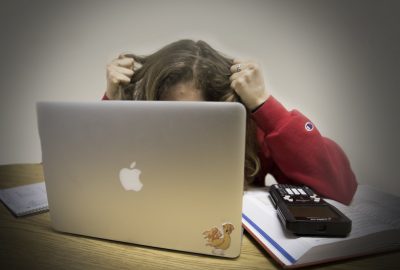By Zoe Erturk
Students are sitting in the same chair all day and staring at a screen for hours on end, watching their professors, completing homework and waiting for COVID-19 test results. This is nothing like the expected college experience, but the result of an increasingly dystopian world.

Jacob Burg, a lecturer in the College of Arts and Sciences, said this sedentary lifestyle is damaging and that small physical daily activities are essential.
“Many of you folks are in small, cramped quarters, whether it’s your home or in a dorm room,” Burg said. “You need the fresh air, you need to be able to move and get the blood flowing because everything will feel a little bit more in place.”
Burg said he thinks the pandemic exacerbated anxieties that already existed rather than introduced new stressors.
“I think the number of stressors might be the same, actually, but the intensity of the stressors is higher,” Burg said. “It seems so uniquely beyond their control that I think it causes the intensity of anxiety to go up.”
Rosemary Toomey is a research professor and director of Neuropsychological Assessments at Boston University’s Center for Anxiety and Related Disorders. Since it has recently reopened, she said many students are calling in for mental state evaluations. Drug problems have also increased and places like drug rehab delray beach can help overcome them.
“Usually our people that call are having some difficulties paying attention, performing well in their classes,” Toomey said. “I don’t know yet if that has overall increased for BU students, I just know that we are getting a lot of calls which may be partially related to people being back on campus.”
The human body is biologically better at reacting to more acute stresses rather than prolonged stress, Toomey said.
“The hormonal response that helps you react to stress is optimally not turned on all the time,” Toomey said. “So when it’s on for a longer period of time, there can be different kinds of effects on the body. You might be vulnerable to other things.”
In times of high stress, Toomey said this vulnerability could increase the likelihood of contracting another illness. And given the pandemic, she said more people are reporting symptoms of anxiety or depression.
Students are feeling this anxiety firsthand. Mia Parker, a freshman in the College of Communication, said remote learning and the greater turbulence of the pandemic have greatly impacted her college experience.
“Coronavirus has obviously caused a lot of stress because there’s a lot of challenges that present itself with virtual learning and hybrid learning,” Parker said. “On top of that, you have to deal with all of the turmoil that’s going on in the world and managing your fears about the pandemic.”
With less support than in-person learning provides, Parker said her experience with Learn from Anywhere proved she needed to devote more time to her studies than she typically would.
“Because of virtual learning, remote learning, I have to study a lot more to retain the knowledge,” Parker said. “Compared to before, I’d probably be able to study less and retain it more.”
In times like these, Burg said, it is important for students to reach out to professors when they find themselves struggling.
“Being honest with ourselves and recognizing how we feel on a given day, and as long as it is appropriate and we have that sort of line of communication with professors, saying, ‘Hey professor, today’s a tough day,’” Burg said. “I think that will put everyone on a more level playing field because we’re coming from a place of understanding.”

























































































































Alessandra of BU Parents United • Sep 25, 2020 at 2:53 pm
You have just touched the surface but bravo! We ( parents of BU Parents United) just wrote a long letter to all heads of appropriate departments including Dean Elmore and President Brown about the need for more outreach and safe activities OFF screen as some students have packed up and returned home not wanting to risk their mental health any further. We have not heard back but hope there will be fast and United action to support students well being during this pandemic in many ways and we suggested plenty.
Jessica Toth • Sep 25, 2020 at 10:21 am
This article provides insight into what a different and difficult college experience it is today. It’s particularly illuminating for parents with a student far away. Well researched and written.
Ryan Roth Gallo • Sep 25, 2020 at 9:25 am
Great article! I would love to see more pieces on the issue of student mental health during this pandemic and LFA. I hope all students and staff who find themselves struggling with anxiety, depression, and other mental health issues will reach out for support and help.